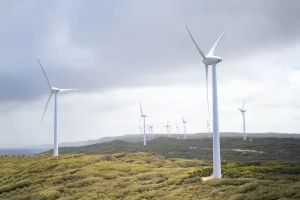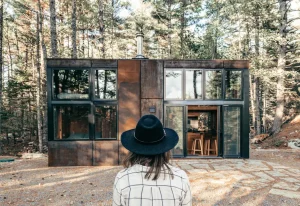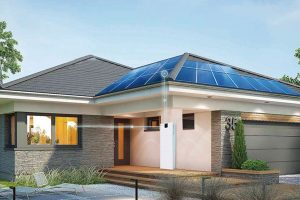In some regions, off-grid living is a traditional way of life, particularly in rural or remote areas where access to centralized utilities is limited or nonexistent. These populations have been living off-grid for generations, relying on their own resources and sustainable practices.

In recent years, there has been a growing interest in off-grid living among individuals and families seeking alternative and sustainable lifestyles. Some individuals choose to live off-grid partially, supplementing their grid-based resources with renewable energy sources or practicing sustainable living principles.
What are the benefits of living off-grid?
Living off-grid offers several benefits, which can vary depending on individual preferences and goals. Here are some commonly cited advantages of living off-grid:
- Energy independence. By generating your own electricity through renewable energy sources like solar, wind, or hydro power, you become less reliant on the grid and traditional energy providers. This independence provides a sense of control over your energy production and usage.
- Reduced utility bills. Generating your own energy means significantly lower or even zero utility bills. Over time, the savings on electricity costs can be substantial, allowing you to allocate your resources elsewhere.
- Environmental sustainability. Living off-grid promotes a reduced carbon footprint and environmental conservation. By relying on renewable energy sources, you decrease reliance on fossil fuels, reduce greenhouse gas emissions, and contribute to mitigating climate change.
- Self-sufficiency and resilience. Off-grid living fosters self-sufficiency by cultivating skills in areas such as gardening, food preservation, water management, and basic maintenance. This self-reliance enhances resilience in the face of potential disruptions to public utilities or supply chains.
- Connection with nature. Living off-grid often means residing in natural and secluded settings. This can provide a greater connection with nature, offering peace, tranquility, and the opportunity to appreciate the beauty of the environment.
- Reduced dependency on external resources. Off-grid living encourages resource conservation and efficient use. By consuming fewer resources and being more self-reliant, you minimize reliance on external systems and reduce the demand for resources like water and non-renewable energy.
- Financial savings. Living off-grid can lead to significant long-term cost savings. While the initial investment in setting up renewable energy systems and infrastructure may be higher, the elimination or reduction of ongoing utility bills can provide substantial financial benefits over time.
- Simplified lifestyle. Off-grid living often entails a simpler and less materialistic lifestyle. With reduced reliance on modern conveniences, there can be a shift towards prioritizing experiences, meaningful connections, and a more sustainable approach to consumption.
- Flexibility and adaptability. Living off-grid encourages adaptability and creative problem-solving. It allows for innovative solutions to meet individual needs and challenges, fostering a sense of autonomy and personal growth.
- Community and self-reliant networks. Off-grid communities often form strong bonds, sharing knowledge, resources, and support. These communities create a sense of belonging, collaboration, and mutual assistance, enhancing social connections and a sense of community.
It’s important to note that living off-grid requires careful planning, research, and adaptation to different living conditions. The benefits may vary based on factors such as location, available resources, personal goals, and the level of self-sufficiency one desires.
What are the first steps of living off-grid?
Living off-grid requires careful planning, resource management, and lifestyle adjustments. Here are some steps to help you get started with living off-grid:
- Assess your needs and goals. Determine your energy, water, and food requirements, as well as your reasons for living off-grid. Understand your goals, whether they are focused on sustainability, self-sufficiency, cost savings, or a desire for a simpler lifestyle.
- Find a suitable location. Look for a location that aligns with your off-grid lifestyle goals. Consider factors like access to sunlight for solar power, availability of water sources, land for gardening or farming, and local regulations or permits.
- Generate your own electricity. Invest in renewable energy systems, such as solar panels, wind turbines, or micro-hydropower, to generate electricity for your needs. Assess your power requirements and design a system that can handle your energy demand. Install a battery storage system to store excess energy for use during low-production periods or at night.
- Manage water resources. Develop a reliable and sustainable water supply. Install rainwater harvesting systems, dig a well, or explore other methods of obtaining and storing water. Implement water conservation practices to minimize usage and waste. Use filtration and purification systems to ensure the water is safe for consumption.
- Waste management. Establish appropriate waste management systems. Compost organic waste for fertilizing gardens or crops. Utilize recycling and proper disposal methods for non-biodegradable waste. Consider using eco-friendly products and adopting a minimalistic lifestyle to reduce waste generation.
- Grow your own food. Develop a sustainable food source by starting a garden or practicing permaculture. Grow vegetables, fruits, and herbs suited to your climate and available space. Consider raising livestock or keeping chickens for eggs and meat, if local regulations permit.
- Optimize energy efficiency. Prioritize energy-efficient practices to reduce your energy consumption. Use energy-efficient appliances and lighting, insulate your home properly, and design your living space to take advantage of natural lighting and ventilation.
- Learn and acquire necessary skills. Acquire skills relevant to off-grid living, such as gardening, animal husbandry, basic home maintenance, and renewable energy system troubleshooting. Continuously learn and adapt to the off-grid lifestyle, seeking knowledge from books, online resources, workshops, or connecting with experienced off-grid communities.
- Establish communication and connectivity. Consider communication options for emergencies and staying connected. Install alternative communication methods such as satellite phones or radios if you are in a remote area with limited cell phone coverage.
- Adapt to a sustainable lifestyle. Embrace a more sustainable and mindful lifestyle. Conserve resources, reduce waste, practice sustainable consumption, and prioritize self-reliance. Adjust your daily routines and habits to align with the availability and limitations of your off-grid resources.
Living off-grid requires careful planning, resource management, and adaptability. It is essential to understand the local regulations, building codes, and zoning laws in your chosen location. It’s also valuable to connect with the off-grid community, attend workshops, and learn from experienced off-grid individuals to gain insights and support during your journey.



